Terri Sewell says Fiscal Year 2023 Omnibus Bill provides billions in federal funds for Alabama projects
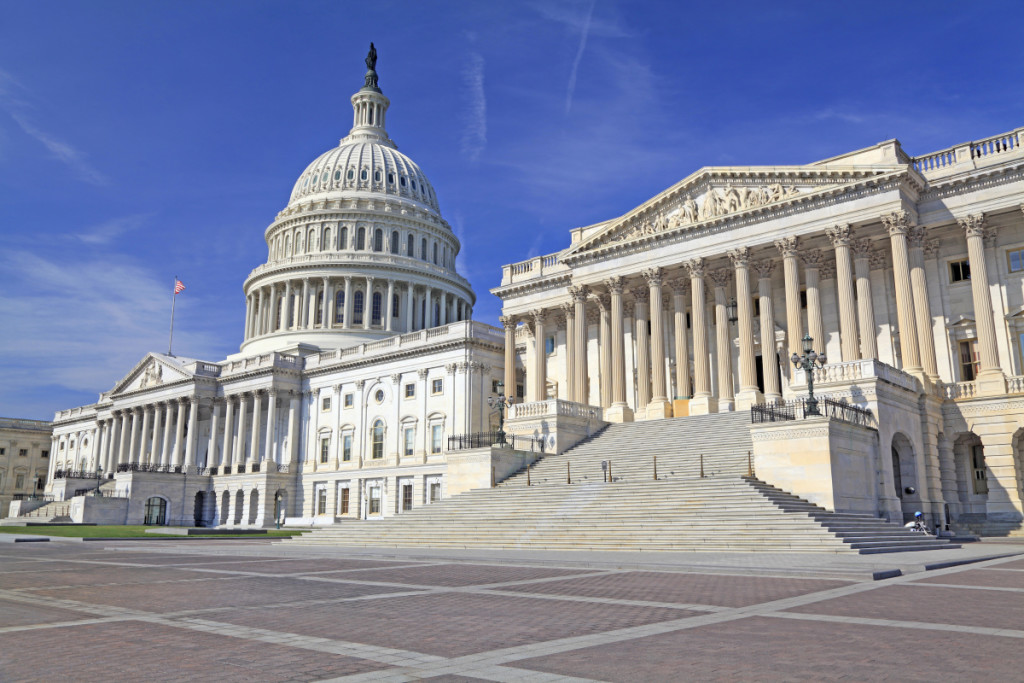
On Wednesday, Congresswoman Terri Sewell (D-AL07) celebrated the inclusion of billions in federal funding for the state of Alabama in the Fiscal Year 2023 omnibus funding bill, which passed the House and Senate last week. Sewell holds a senior leadership role in the Democratic leadership team in the outgoing Democratic leadership in the House. U.S. Sen. Richard Shelby was the lead Republican negotiator on the Omnibus in the Senate. This bill was most likely his last vote in Congress after 44 years of service to the State of Alabama. “I was thrilled to vote in favor of the FY23 funding bill because I know that it will be a game changer for the people of Alabama,” Rep. Sewell said in a press release. “I would also like to thank Senator Richard Shelby for his work to ensure that Alabama received a historic amount of funding during his last year as a United States Senator. His leadership, his pragmatic approach to governing, and his fierce advocacy for the people of Alabama will be missed.” President Joe Biden announced that he would sign the bill after it passed both the Senate and the House of Representatives. “This bill is good for our economy, our competitiveness, and our communities – and I will sign it into law as soon as it reaches my desk,” Biden said in a statement. “This bill will advance cutting-edge research on cancer and other diseases through my ARPA-H initiative. It will put more cops on the beat, invest in community policing, and provide the highest funding level for the Violence Against Women Act in history. It will help us meet our sacred obligation to America’s veterans and deliver on the promise of the PACT Act, my bipartisan legislation to expand health care benefits to veterans. It will provide additional assistance to Ukraine, another demonstration of our bipartisan support for Ukraine after President [Volodymyr] Zelenskyy’s visit. It will help communities recovering from devastating natural disasters get back on their feet. And it’ll strengthen worker protections for pregnant women.” President Biden also thanked Shelby for his leadership in the passage of the bipartisan Year-End Omnibus. “I want to thank Senator Leahy, Senator Shelby, and Chairwoman DeLauro for their tireless work to get this done. Neither side got everything it wanted in this agreement – that’s what happens in a negotiation. And bipartisan members of Congress passed the Electoral Count Act and took long overdue steps to protect the integrity of our elections. This is critical bipartisan action that will help ensure that the will of the people is preserved. I want to thank Senators [Susan] Collins and [Joe] Manchin, as well as Senators [Amy] Klobuchar and [Roy]Blunt, for finding compromise to strengthen our democracy in the face of election denialism and assaults on our bedrock constitutional values.” “This bill is further proof that Republicans and Democrats can come together to deliver for the American people, and I’m looking forward to continued bipartisan progress in the year ahead,” Biden concluded. Shelby has retired from public service, so there will be a new Vice Chair of the Senate appropriations committee in January. Democrats no longer control the House of Representatives. There is a strong likelihood that when House Republicans finally figure out their leadership conundrum that Congressman Robert Aderholt will be the new Chairman of the House Appropriations Committee. Sewell shared the list of funding items for Alabama in the FY23 Omnibus funding bill. The list includes: $76 million for the University of Alabama Birmingham (UAB) Heersink School of Medicine to build a new biomedical research building. $55 million for the Secret Service’s National Computer Forensics Institute (NCFI), located in Hoover, to expand training opportunities for state and local law enforcement and legal and judicial professionals in computer forensics and cyber investigations. $5 million for the Secret Service’s Cyber Fraud Task Forces to increase mission effectiveness and provide modern investigative capabilities to combat transnational crimes. $23 million to repurpose and renovate NCFI facilities to accommodate for the ongoing growth of the program. $30 million in funding for Alabama’s Northern Beltline of the Appalachian Development Highway System. $47.5 billion for the National Institutes of Health (NIH), an increase of nearly $2.5 billion above FY22 funding level. $7.32 billion for the National Cancer Institute (NCI), an increase of $407.6 million from FY22. $923 million for the National Center for Advancing Translational Sciences (NCATS). $629 million for Clinical and Translational Science Awards (CTSAs), which continues funding for a CTSA award at UAB. $25 million in grant funding for the Regional Pediatric Pandemic Network, a network of ten Children’s hospitals, including Children’s of Alabama. $52 million in targeted funds for Regional Biocontainment Laboratories (RBLs) to test FDA-approved drugs at research institutions across the country, including UAB. $280.295 million for the NIH, Helping to End Addiction Long-term (HEAL) Initiative, to address addiction and develop alternative opioids for safe and effective pain management. $520.163 million for the National Institute of Dental and Craniofacial Research and continued support of the National Dental Practice-Based Research Network, founded and hosted at UAB. $47 million for Area Health Education Centers (AHECs), which supports the Alabama Statewide AHEC Program that is hosted within the UAB Department of Family and Community Medicine. $119 million for the National Institute on Disability, Independent Living, and Rehabilitation Research (NIDILRR), which supports the Rehabilitation Engineering Research Center on Recreational Technologies (RERC Rec-Tech) in Birmingham. $8 million in Emerging Infectious Diseases for the Centers for Disease Control and Prevention (CDC) to utilize its clinical trial partners and the Mycoses Study Group, which is affiliated with UAB. Funding consistent with a cooperative agreement to support the Department of Energy’s National Carbon Capture Center in Wilsonville, Alabama. $4.5 million, $1.5 million above the FY22 enacted level, for the NIST Cybersecurity of Genomic Data program, which supports ongoing research in cybersecurity for genomic and biomedical-based systems at the University of Alabama at Birmingham. $15 million military construction project building a Commercial Vehicle Inspection Gate at Maxwell Air Force Base. $6+ million military construction project building an F-35 Weapons Load Crew
U.S. Senate to vote on Respect for Marriage Act; several groups say it’s unconstitutional
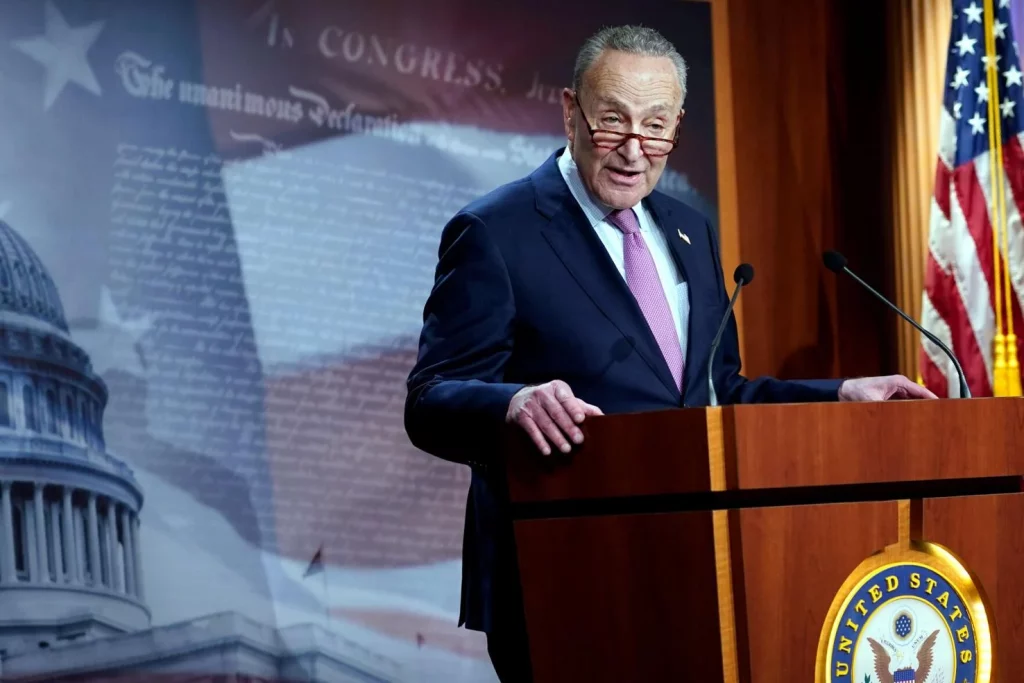
Several groups argue the Respect for Marriage Act (ROMA) currently before the U.S. Senate is unconstitutional and, if enacted, will eventually be struck down by the U.S. Supreme Court. The bill, HR 8404, was introduced in the House by U.S. Rep. Jerry Nadler, D-NY, on July 18 and passed by a vote of 267-157 the next day. The U.S. Senate took it up on Nov. 14. It would provide “statutory authority for same-sex and interracial marriages” and repeal several provisions of the 1996 Defense of Marriage Act (DOMA). The 1996 law received bipartisan support, including from then U.S. Sen. Joe Biden and U.S. Rep. Chuck Schumer, D-NY, and from Democratic President Bill Clinton, who signed it. When a constitutional amendment was proposed to ban same-sex marriage in 2006, Sen. Biden told Meet the Press’s Tim Russert, “I can’t believe the American people can’t see through this. We already have a law, the Defense of Marriage Act … where I voted and others … that marriage is between a man and a woman, and states must respect that. … Why do we need a constitutional amendment? Marriage is between a man and a woman.” Sixteen years later, President Biden now supports replacing DOMA provisions, which “define, for purposes of federal law, marriage as between a man and a woman and spouse as a person of the opposite sex,” with ROMA provisions “that recognize any marriage that is valid under state law,” according to the bill summary. The summary also notes that the Supreme Court ruled three marriage-related laws as unconstitutional: DOMA (U.S. v. Windsor, 2013) and state laws banning same-sex marriage (Obergefell v. Hodges, 2015), and interracial marriage (Loving v. Virginia 1967). The bill would also allow “the Department of Justice to bring a civil action and establishes a private right of action for violations,” its summary states. When filing a cloture motion on a substitute amendment on Nov. 17, now Senate Majority Leader Schumer said the Senate would vote on ROMA when it returned on Monday after Thanksgiving. He said, “Let me be clear,” passing it “is not a matter of if but only when.” He also thanked his colleagues from both sides of the aisle “who led this bill.” Twelve Republicans voted with Democrats to allow it to move forward, eliminating a filibuster threat: Sens. Roy Blunt, Richard Burr, Shelley Capito, Susan Collins, Cynthia Lummis, Rob Portman, Mitt Romney, Dan Sullivan, Thom Tillis, Joni Ernst, Lisa Murkowski, and Todd Young. After their vote, Biden said, “Love is love, and Americans should have the right to marry the person they love,” adding their vote made “the United States one step closer to protecting that right in law.” Schumer also said he had “zero doubt” the bill “will soon be law of the land.” But multiple groups disagree, arguing it’s unconstitutional for the same reasons the Supreme Court struck down DOMA. Because the court already ruled Congress doesn’t have the constitutional authority to define marriage under Article 1 of the U.S. Constitution, and because ROMA is nearly identical to DOMA, they argue it will also likely be struck down. In a letter to Congress, the nonprofit religious freedom organization Liberty Counsel argues the court ruled in Windsor, “DOMA, because of its reach and extent, departs from this history and tradition of reliance on state law to define marriage.” It also ruled, “[b]y history and tradition the definition and regulation of marriage . . . has been treated as being within the authority and realm of the separate States.” Liberty Counsel Founder and Chairman Mat Staver, said, “The Constitution cannot be said to prohibit the exercise of power to define marriage in one manner yet authorize the opposite definition of that same unconstitutional exercise of power. If Windsor noted that Congress lacked authority in this realm, then it necessarily lacks the power here.” While a bipartisan amendment was introduced claiming to protect religious liberty, Sen. Mike Lee, R-Utah, argues it really doesn’t. “Religious Americans will be subject to potentially ruinous litigation, while the tax-exempt status of certain charitable organizations, educational institutions, and non-profits will be threatened. My amendment would have shored up these vulnerabilities,” he said. Heritage Foundation President Kevin Roberts said, “Conservatives are deeply disappointed by the betrayal of Senate Republicans to protect Americans’ religious freedom and won’t soon forget the votes of the 12 Republican senators who cast aside an essential right in a bill that will weaponize the federal government against believers of nearly every major religion.” Gregory Baylor, senior counsel with Alliance for Defending Freedom, also said the law is “unnecessary and could have a disastrous effect on religious freedom. While proponents of the bill claim that it simply codifies the 2015 Obergefell decision, in reality, it is an intentional attack on the religious freedom of millions of Americans with sincerely held beliefs about marriage.” It also “threatens religious freedom and the institution of marriage” by codifying a “false definition of marriage in the American legal fabric,” ADF argues. It also “opens the door to federal recognition of polygamous relationships, jeopardizes the tax-exempt status of nonprofits that exercise their belief that marriage is the union of one man and one woman, and endangers faith-based social-service organizations by threatening litigation and liability risk if they follow their views on marriage when working with the government.” Republished with the permission of The Center Square.
Bipartisan deal near on trimmed $10 billion COVID bill

Lawmakers moved to the brink Thursday of shaking hands on a scaled-back bipartisan compromise providing a fresh $10 billion to combat COVID-19, a deal that could set up final congressional approval next week. The price tag was down from an earlier $15.6 billion agreement between the two parties that collapsed weeks ago after House Democrats rejected cutting unused pandemic aid to states to help pay for it. President Joe Biden requested $22.5 billion in early March. With leaders hoping to move the package through Congress quickly, the lowered cost seemed to reflect both parties’ calculations that agreeing soon to additional savings would be too hard. The effort, which would finance steps like vaccines, treatments, and tests, comes as Biden and other Democrats have warned the government is running out of money to counter the pandemic. At the same time, the more transmissible omicron variant BA.2 has been spreading quickly in the U.S. and abroad. “We’ve reached an agreement in principle on all the spending and all of the offsets,” Sen. Mitt Romney of Utah, the lead Republican bargainer, told reporters, using Washington-speak for savings. “It’s entirely balanced by offsets.” Senate Majority Leader Chuck Schumer, D-N.Y., and others were more circumspect. “We are getting close to a final agreement that would garner bipartisan support,” Schumer said on the Senate floor. He said lawmakers were still finalizing the bill’s components and language and awaiting a cost estimate from the nonpartisan Congressional Budget Office. Sen. Patty Murray, D-Wash., chair of the Senate health committee and another bargainer, said, “I’m hoping,” when asked about Romney’s assessment. Once clinched, an agreement would represent a semblance of bipartisan cooperation in battling the pandemic that dissolved a year ago, when a far larger, $1.9 trillion measure proposed by the new president cleared Congress with only Democratic votes. That bill was laden with spending to help struggling families, businesses, and communities, while this one would be aimed exclusively at public health. Many Republicans have been willing to go along with the new expenditures but have insisted on paying for them with unspent funds from previous bills Congress has enacted to address the pandemic. Half the new measure’s $10 billion would be used for treatments, said Sen. Roy Blunt, R-Mo., who has helped negotiate the agreement. He said top federal health officials would be given wide discretion on spending the rest of it, but it would include research and other steps for battling the disease, which has killed around 975,000 Americans and millions across the world. Romney and others said savings the two parties had agreed to for the new bill would not include the cuts in state assistance that House Democrats opposed. He said some unused funds would be culled from another pandemic program that gives state and local governments funds for grants to local businesses. Blunt said both sides had also agreed to savings that include pulling back an unspent $2.2 billion for aiding entertainment venues closed during the pandemic and more than $2 billion still available for assisting aviation manufacturing. Romney said the $10 billion might include $1 billion for vaccines, treatments, and other support for countries overseas. Blunt said that figure seemed unresolved. One-third of the earlier $15.6 billion measure had been slated to go abroad. The lowered figure for assisting other countries encountered opposition in the House, where some Democrats wanted to boost the figure. Epidemiologists have cited the need to vaccinate more people around the world and reduce the virus’ opportunities for spinning off new variants. “It’s a problem,” House Speaker Nancy Pelosi, D-Calif., told reporters. “It’s a shame.” Kate Bedingfield, White House communications director, said officials were “very hopeful” an agreement would be reached and prodded lawmakers to include funds to help other countries cope with the disease. “We’re not going to be able to put this pandemic behind us until we stop the spread and proliferation of new variants globally,” Bedingfield said. Leaders hope Congress can approve the legislation before lawmakers leave for a spring recess after next week. Republicans have leverage in the Democratic-controlled, 50-50 Senate because 60 votes are needed to pass most major bills. Romney and Blunt both said they believed a finalized package they described would attract significantly more than the 10 GOP votes needed. Since the pandemic began, Congress has approved more than $5 trillion to address the economic and health crises it produced. Only a small fraction of that has been for public health programs like vaccines. In an interview earlier Thursday with Punchbowl News, Senate Republican Leader Mitch McConnell, R-Ky., said the measure’s price tag seemed to have fallen to $10 billion because Democrats weren’t agreeing to additional savings. Minutes later, Schumer took to the Senate floor and mentioned no figures but suggested its size could fall. “I’m pleading with my Republican colleagues, join us,” Schumer said. “We want more than you do, but we have to get something done. We have to get something done.” Asked if he thought an agreement could be reached before lawmakers’ recess, McConnell said, “We’ll see. Hope so.” Republished with the permission of the Associated Press.
Analysis: Republicans poised to do well in 2022 midterm elections
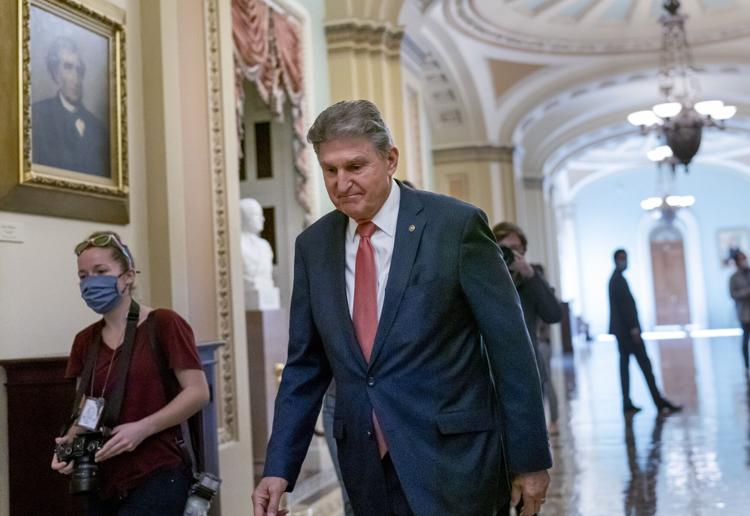
Less than a year out from the November 2022 midterm elections, Republicans are in a position to pick up more seats than previously expected after redistricting was finalized across the states and 44 members of Congress, a majority of them Democrats, are either retiring or aren’t running for reelection. Skyrocketing inflation and energy costs and President Joe Biden’s declining polling numbers could result in Democrats losing dozens of Congressional seats, political analysts indicate. As of this month, six sitting members of the U.S. Senate and 38 in the U.S. House are leaving office, according to calculations by Ballotpedia. Of the 37 leaving the U.S. House, 26 are Democrats and 12 are Republicans. The majority – 28 – are retiring. They include six senators, five of whom are Republicans, and 22 representatives, 17 of whom are Democrats. The remainder, 15, are running for another office. Eight House members are running for a U.S. Senate seat, evenly split among Republicans and Democrats, with four each. They are from Vermont, Pennsylvania, Missouri, Florida, North Carolina, Ohio, and Alabama. Three House members are running for governor – one Democrat and one Republican in New York, and one Democrat in Florida. Others are running for state and local offices in Texas, Maryland, California, and Georgia. They include one Republican running for secretary of state, one Republican and one Democrat running for attorney general, and one Democrat running for mayor. No U.S. Senator is running for another office; all six are retiring. They include Republicans Richard Burr of North Carolina, Pat Toomey of Pennsylvania, Rob Portman of Ohio, Richard Shelby of Alabama, Roy Blunt of Missouri, and Democrat Patrick Leahy of Vermont. A Washington Post/ABC News poll found that Republicans hold a 10-point margin over Democrats in a generic congressional race. Biden’s approval rating on the economy was 39%, and his overall approval rating was 41% at the time. A December Rasmussen Reports survey also found that voters favored Republicans over Democrats by 13 points, 51%-38%, at the time. An even wider margin of 22% was found among voters who identify as Independents, who said they would choose a generic Republican over a generic Democrat by a margin of 48%-26%. Currently, Democrats hold a nine-seat majority in the U.S. House. The U.S. Senate is split, with 50 Republicans, 48 Democrats and 2 Independents, with the Independents caucusing with the Democrats, and the Democratic vice president acting as a tie breaker. This could change with West Virginia Democratic Sen. Joe Manchin considering leaving the Democratic Party. “I would like to hope that there are still Democrats that feel like I do,” Manchin told a local West Virginia radio station, as reported by the Washington Post. “Now, if there’s no Democrats like that, then they’ll have to push me wherever they want me.” Manchin also told reporters last month that he’d consider leaving the Democratic Party if he were to become “an embarrassment to my Democrat colleagues,” as a “moderate centrist Democrat.” He said he’d still caucus with the Democrats, enabling them to keep the majority temporarily. Historically, since the end of World War II, the sitting president’s party has lost seats nearly every midterm election. A total of 469 seats in Congress are up for reelection in 2022, including 34 in the Senate and all 435 in the House. As a result of changing demographics reported by the 2020 Census, six states gained congressional seats, with Texas gaining two. Five states gained one seat: Colorado, Florida, Montana, North Carolina, and Oregon. Seven states lost a seat: California, Illinois, Michigan, New York, Ohio, Pennsylvania, and West Virginia. By Bethany Blankley | The Center Square contributor Republished with the permission of The Center Square.
Judge stops federal COVID-19 vaccine mandate in Medicare, Medicaid facilities in 10 states

U.S. District Judge Matthew T. Schelp on Monday ordered a preliminary injunction against the Biden Administration, stopping mandated COVID-19 vaccinations for health care workers in Centers for Medicare and Medicaid Services (CMS) facilities. “Because it is evident CMS significantly understates the burden that its mandate would impose on the ability of healthcare facilities to provide proper care, and thus, save lives, the public has an interest in maintaining the ‘status quo’ while the merits of the case are determined,” Schelp wrote in a 32-page memorandum and order in the U.S. District Court in the Eastern District of Missouri. Missouri Republican Attorney General Eric Schmitt led a 10-state coalition filing the lawsuit on November 5 to stop the CMS vaccine mandate. On the courthouse steps in St. Louis, Schmitt, a candidate for the seat of retiring Republican U.S. Senator Roy Blunt, stated many will benefit from the ruling. “This is a significant ruling and the first of its kind in the country,” Schmitt told reporters. “What the court said today was CMS and the Biden administration has no statutory authority to do this, none whatsoever.” Starting in late October, Schmitt led coalitions of states in filing three lawsuits against federal vaccine mandates – for federal contractors and federally contracted employees, for the Occupational Safety and Health Administration’s mandate on private employers with 100 or more employees, and CMS. The Fifth U.S. Circuit Court of Appeals in New Orleans blocked the private-sector OSHA mandate earlier this month. Schmitt said Monday’s ruling will help all Missourians and all served in CMS facilities. “Our office may have led the charge on this, but it is the health care workers in Missouri and across the country, it’s the rural hospitals here and elsewhere facing certain collapse due to this mandate, and it’s the patients of those hospitals who are the real winners today,” Schmitt said. Judge Schelp stated five times in the ruling that it’s likely Schmitt and the coalition will ultimately succeed if the ruling is appealed. The ruling only applies to the 10 states in the lawsuit – Alaska, Arkansas, Iowa, Kansas, Missouri, Nebraska, New Hampshire, North Dakota, South Dakota, and Wyoming. “I would expect this to be appealed and I would expect this to go all of the way to the Supreme Court,” Schmitt said. “But the fact is we won.” The ruling stated CMS lacked clear authorization from Congress to mandate the COVID-19 vaccine. Currently, CMS doesn’t require any vaccinations for health care workers. “CMS failed to adequately explain its contradiction to its long-standing practice of encouraging rather than forcing – by governmental mandate – vaccination,” Schelp wrote. “For years, CMS has promulgated regulations setting the conditions for Medicare and Medicaid participation; never has it required any vaccine for covered facilities’ employees – despite concerns over other illnesses and their corresponding low vaccination rates.” Schelp also stated CMS violated its own regulations by not accepting comments on policies. “Moreover, the failure to take and respond to comments feeds into the very vaccine hesitancy CMS acknowledges is so daunting,” Schelp wrote. Schelp highlighted the vaccine mandate’s negative impact on staffing at rural hospitals. “As an example, for a general hospital located in North Platte, Nebraska, implementation of the mandate would result in the loss of the only remaining anesthesiologist,” Schelp wrote. “Understandably, without an anesthesiologist, there could be no surgeries – at all. Thus, such a loss irreparably causes a cascading effect on the entire facility and a wide range of patients. Other examples show the mandate’s far-reaching implications not just on the administration of health care itself, but the functioning of the facilities in general.” Schmitt said the virus will always be present and the federal government needs to understand citizens and their rights. “The truth is COVID is with us and there is always going to be a variant,” Schmitt said. “But I think the people have had enough of the government locking people down. They have had enough of government instituting mask mandates and vaccine mandates. Every time there’s an overreach, we’re going to push back.” Bureaucrats who have never driven the back roads of Missouri or visited its rural hospitals have no idea of the effects of the vaccine mandate, Schmitt said. “Here in flyover country, we’ve had enough and we’re going to fight back every single time they try to take our freedoms away,” Schmitt said. By Joe Mueller | The Center Square Republished with the permission of The Center Square
Voting bill showdown looms as GOP rejects Manchin plan
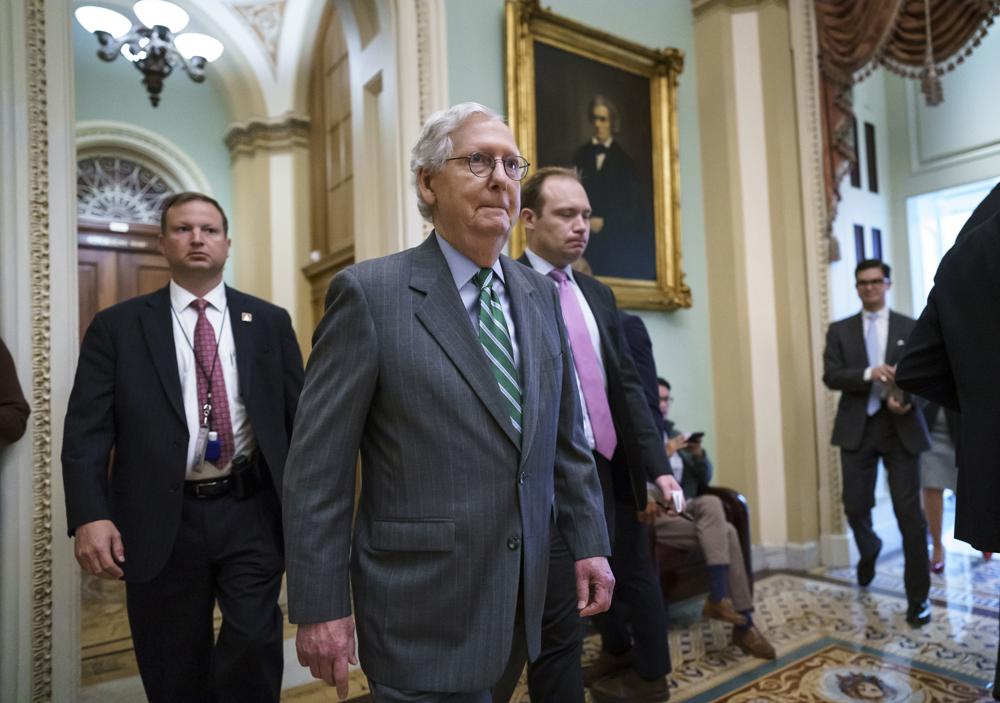
The Senate is set for a key vote Tuesday on a sweeping rewrite of voting and election law, setting up a dramatic test of Democratic unity on a top priority that Republicans are vowing to block. Democrats appeared to be coalescing Thursday around changes to the bill that could win the support of moderate West Virginia Sen. Joe Manchin, the lone Democratic holdout on the legislation. Yet, they still faced lockstep Republican opposition that will likely leave Democrats back where they started: lacking the votes to overcome a Republican filibuster. Senate Minority Leader Mitch McConnell, R-Ky., called Manchin’s proposal “equally unacceptable.” “Republicans are digging in their heels,” said Sen. Chris Murphy of Connecticut. “They’ve made it pretty clear this week that there’s nothing they’re willing to support.” The bill, known as the For the People Act, has been touted as Democrats’ answer to a state level-GOP push to enact voting restrictions following the 2020 election. It passed the House in March but has bogged down in the Senate as Democrats have debated among themselves — with Manchin ultimately declaring he couldn’t vote for it because it lacked bipartisan support. Yet Manchin’s position has evolved, and compromise appeared to be nearing after he proposed a series of changes this week to narrow its scope. His proposal received a boost Thursday when Stacey Abrams, a former Georgia gubernatorial candidate who is a leading Democratic voice on voting rights, said she “absolutely” supported it. “What Sen. Manchin is putting forward are some basic building blocks that we need to ensure that democracy is accessible,” Abrams told CNN. Still, in a narrowly divided Senate where Democrats must count on Vice President Kamala Harris to cast tie-breaking votes, any compromise will likely be for naught unless changes are made to Senate filibuster rules, which Manchin and others oppose. For now, it takes 60 votes to overcome a filibuster and advance legislation. Over a dozen Senate Republicans took turns at the microphone during a Thursday news conference to denounce the bill, which they view as a federal overreach into state and local elections. McConnell predicted all Republicans would remain in lockstep opposition regardless of what changes are made. Sen. Roy Blunt, the No. 4 ranking Senate Republican, noted the endorsement by Abrams, who is a lightning rod for GOP criticism. “I actually think when Stacey Abrams immediately endorsed Sen. Machin’s proposal, it became the Stacey Abrams (bill), not the Joe Manchin (bill),” he told reporters Thursday. As written, the Democrats’ bill would bring about the largest overhaul of U.S. voting in a generation, touching nearly every aspect of the electoral process. It would blunt laws erected in the name of election security, like voter ID requirements, while curtailing the influence of big money in politics. It would create a nonpartisan process for redrawing congressional districts, expand mail voting and early voting, restore the rights of felons to cast a ballot, and scores of other provisions. Manchin’s counter-offer, which is intended to entice GOP support, would leave significant portions of the sprawling bill intact while curtailing, rewriting, or eliminating other key parts. “Color me a little a little skeptical,” Democratic Sen. Tim Kaine of Virginia said of the possibility of bipartisanship. What will ultimately come to the floor for a vote Tuesday remains unclear. Also not certain: whether Manchin will vote for it. “We’ll see what bill we have,” he told reporters Thursday. “We don’t know what bill we’re going to have.” A national voter ID requirement favored by Manchin has emerged as one sticking point with some Democrats. Manchin’s proposal is far softer than the strict photo ID requirements adopted by some states. It would require all states to check ID, but various documents, including a utility bill, could be used instead of a photo ID, a requirement already adopted by 15 states, including Manchin’s West Virginia. “That is what we’re negotiating,” said Minnesota Sen. Amy Klobuchar, who is playing a lead role in guiding the legislation. Polls have shown notable bipartisan support for voter ID requirements, and Democrats in their elections overhaul focused on the strictest ID laws. In the current Senate bill, Democrats would require states with an ID law to allow voters who show up without identification to cast a regular ballot as long as they sign an affidavit under penalty of perjury. “We might squabble about one or two things,” said Sen. Raphael Warnock of Georgia. “But I am not about to sacrifice the good in the pursuit of the perfect.” Klobuchar said she would continue to work on the bill over the weekend and was optimistic all 50 Senate Democrats would support it. “If we reach unity on a voting bill in the Democratic Party, with all of the debates we’ve been having over the last few months, I don’t think anything’s over yet,” she said. Republished with the permission of the Associated Press.
House votes to create panel to probe Jan. 6 insurrection
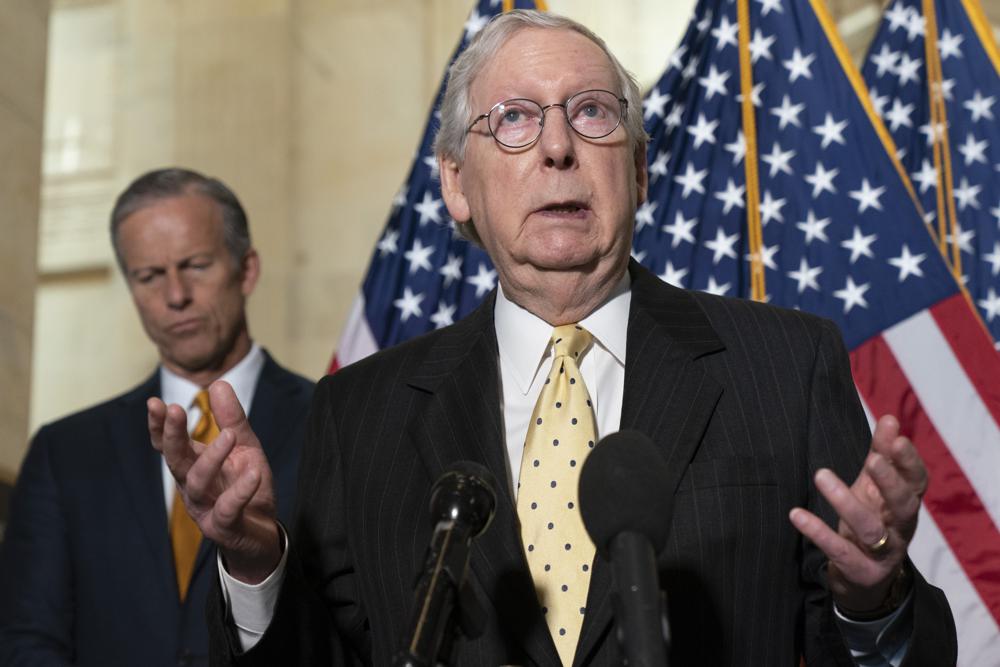
The House voted Wednesday to create an independent commission on the deadly Jan. 6 insurrection at the U.S. Capitol, sending the legislation to an uncertain future in the Senate as Republicans increasingly line up against the bipartisan investigation and align themselves with former President Donald Trump. Democrats say an independent investigation is crucial to reckoning what happened that day when a violent mob of Trump’s supporters smashed into the Capitol to try and overturn President Joe Biden’s victory. Modeled after the investigation into the Sept. 11, 2001, attacks, the legislation would establish an independent, 10-member commission that would make recommendations by the end of the year for securing the Capitol and preventing another insurrection. It passed the House 252-175. But top Republicans in Congress are working to stop it. Senate Republican leader Mitch McConnell said Wednesday morning that he will oppose the legislation, joining with House GOP leader Kevin McCarthy, who came out against it Tuesday. Both men claimed the bill was partisan, even though membership of the proposed commission would be evenly split between the parties. The January insurrection has become an increasingly fraught topic for Republicans, with a growing number in the party downplaying the severity of the worst attack on the Capitol in more than 200 years. While most Republicans voted against forming the commission, only a few spoke on the floor against it. And a handful of Republicans who backed the commission spoke forcefully. “This is about facts — it’s not partisan politics,” said New York Rep. John Katko, the top Republican on the House Homeland Security Committee who negotiated the legislation with Democrats. He said, “the American people and the Capitol Police deserve answers, and action as soon as possible to ensure that nothing like this ever happens again.” Rep. Fred Upton, R-Mich., said that Jan. 6 “is going to haunt this institution for a long, long time” and that a commission is necessary to find the truth about what happened. He recalled that he “heard the shouts, saw the flash-bangs, smelled the gas on that sorry day.” Democrats grew angry as some Republicans suggested the commission was only intended to smear Trump. Several shared their own memories of the insurrection, when rioters brutally beat police, broke in through windows and doors, and sent lawmakers running. Four of the rioters died, including a woman who was shot and killed by police as she tried to break into the House chamber. A Capitol Police officer collapsed and died after engaging with the protesters, and two officers took their own lives in the days after. “We have people scaling the Capitol, hitting the Capitol Police with lead pipes across the head, and we can’t get bipartisanship? What else has to happen in this country?” shouted Rep. Tim Ryan, D-Ohio, on the floor just before the vote. He said the GOP opposition is “a slap in the face to every rank and file cop in the United States.” The vote was yet another test of Republican loyalty to Trump, whose grip on the party remains strong despite his election defeat. House Republicans booted Wyoming Rep. Liz Cheney from their leadership last week for her criticism of Trump’s false claims, installing a Trump loyalist in her place. Cheney, in turn, suggested to ABC News that a commission could subpoena McCarthy because he spoke to Trump during the insurrection. House Speaker Nancy Pelosi, D-Calif., called McCarthy’s opposition to the commission “cowardice.” She released a February letter from the GOP leader in which he asked for an even split of Democrats and Republican commissioners, equal subpoena power, and no predetermined findings or conclusions. The bipartisan legislation accommodates all three of those requests, she said. “Leader McCarthy won’t take yes for an answer,” she said. In the Senate, McConnell’s announcement dimmed the prospects for passage. But Senate Majority Leader Chuck Schumer, D-N.Y., vowed to force a vote on the bill, charging that Republicans are “caving” to Trump. Schumer said that Republicans are trying to “sabotage the commission” and are “drunk” off Trump’s baseless claim that the election was stolen from him. That false assertion, repeated by the mob as the rioters broke into the Capitol, has been rebuked by numerous courts, bipartisan election officials across the country, and Trump’s own attorney general. Trump released a statement Tuesday night urging Republicans to oppose the commission, calling it a “Democrat trap.” Like in the House, some Senate Republicans have suggested they will support the legislation. Utah Sen. Mitt Romney said Tuesday that given the violent attack, “we should understand what mistakes were made and how we could prevent them from happening again.” Louisiana Sen. Bill Cassidy said he doesn’t agree with McConnell that the bill is slanted toward Democrats and “I’m inclined to support it.” Maine Sen. Susan Collins, a Republican, said that she supports the idea of a commission but that the House bill would need adjustments. Others have pushed their colleagues to oppose the commission. Missouri Sen. Roy Blunt, the top Republican on the Senate Rules Committee, is working on a report with his Democratic colleagues that will include recommendations for security upgrades. He said an independent investigation would take too long and “frankly, I don’t think there are that many gaps to be filled in on what happened on Jan. 6, as it relates to building security.” South Dakota Sen. John Thune, the No. 2 Republican in the Senate, cited concern in the caucus that the investigation could be “weaponized politically” in the 2022 election cycle. “I want our midterm message to be about the kinds of issues that the American people are dealing with,” Thune said. “It’s jobs and wages and the economy, national security, safe streets, strong borders and those types of issues, and not relitigating the 2020 election.” Separately Wednesday, aides to Rep. Jamie Raskin, D-Md., circulated a letter they said was from a group of around 40-50 anonymous U.S. Capitol Police officers who had been speaking with the congressman. “It is inconceivable that some of the Members we
Donald Trump faces ‘incitement of insurrection’ impeachment charge
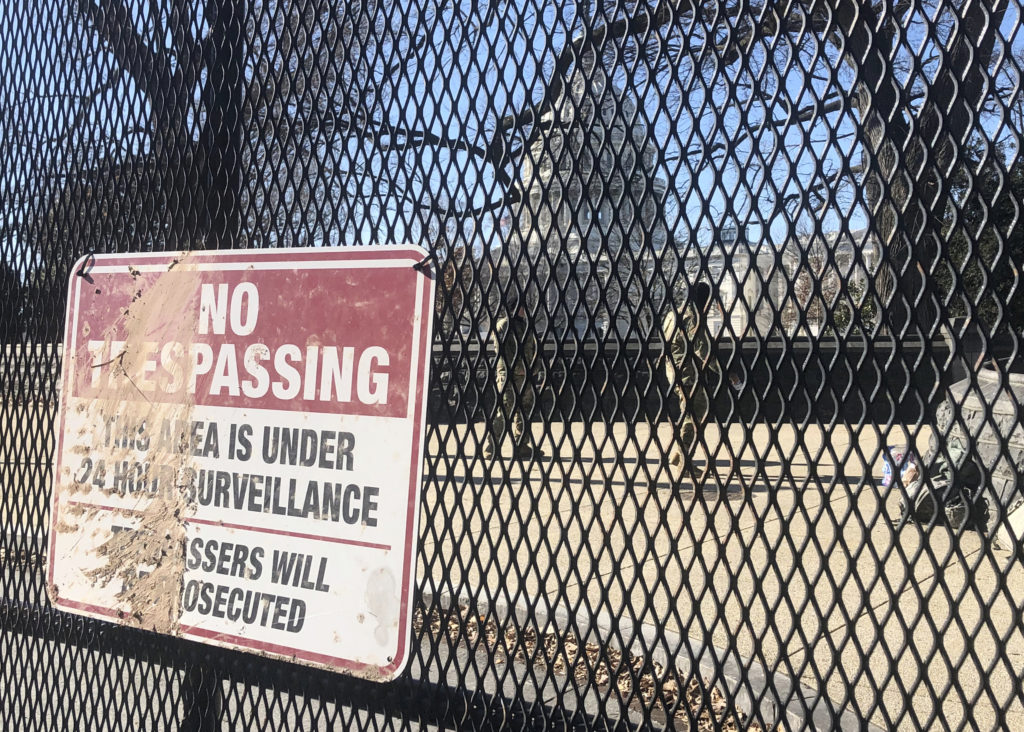
As the House prepares for impeachment, President Donald Trump faces a single charge — “incitement of insurrection” — over the deadly riot at the U.S. Capitol, according to a draft of the articles obtained by The Associated Press. Lawmakers are set to introduce the legislation Monday, with voting mid-week. Pelosi’s leadership team also will seek a quick vote on a resolution calling on Vice President Mike Pence and Cabinet officials to invoke the 25th Amendment. The four-page impeachment bill draws from Trump’s own false statements about his election defeat to Democrat Joe Biden; his pressure on state officials in Georgia to “find” him more votes; and his White House rally ahead of the Capitol siege, in which he encouraged thousands of supporters to “fight like hell” before they stormed the building on Wednesday. A violent and largely white mob of Trump supporters overpowered police, broke through security lines and windows, and rampaged through the Capitol, forcing lawmakers to scatter as they were finalizing Biden’s victory over Trump in the Electoral College. “President Trump gravely endangered the security of the United States and its institutions of Government,” the legislation said. The bill from Reps. David Cicilline of Rhode Island, Ted Lieu of California, Jamie Raskin of Maryland, and Jerrold Nadler of New York, said Trump threatened “the integrity of the democratic system, interfered with the peaceful transition of power” and “betrayed” trust. “He will remain a threat to national security, democracy, and the Constitution if allowed to remain in office,” they wrote. Rep. Adam Schiff, D-Ca., said Monday on CBS, “We need to move forward with alacrity.” House Speaker Nancy Pelosi says the House will proceed with legislation to impeach Trump as she pushes the vice president and the Cabinet to invoke constitutional authority to force him out, warning that Trump is a threat to democracy after the deadly assault on the Capitol. A Republican senator, Pat Toomey of Pennsylvania, joined Republican Sen. Lisa Murkowski of Alaska over the weekend in calling for Trump to “resign and go away as soon as possible.” Lawmakers warned of the damage the president could still do before Joe Biden is inaugurated Jan. 20. Trump, holed up at the White House, was increasingly isolated after a mob rioted in the Capitol in support of his false claims of election fraud. Judges across the country, including some nominated by Trump, repeatedly dismissed cases and Attorney General William Barr, a Trump ally, said there was no sign of any widespread fraud. “We will act with urgency, because this President represents an imminent threat,” Pelosi said in a letter late Sunday to colleagues emphasizing the need for quick action. “The horror of the ongoing assault on our democracy perpetrated by this President is intensified and so is the immediate need for action.” During an interview on “60 Minutes” aired Sunday, Pelosi invoked the Watergate era when Republicans in the Senate told President Richard Nixon, “It’s over.” “That’s what has to happen now,” she said. Pence has given no indication he would act on the 25th Amendment. If he does not, the House would move toward impeachment. Toomey said he doubted impeachment could be done before Biden is inaugurated, even though a growing number of lawmakers say that step is necessary to ensure Trump can never hold elected office again. “I think the president has disqualified himself from ever, certainly, serving in office again,” Toomey said. “I don’t think he is electable in any way.” Murkowski, long exasperated with the president, told the Anchorage Daily News on Friday that Trump simply “needs to get out.” A third, Sen. Roy Blunt, R-Mo., did not go that far, but on Sunday he warned Trump to be “very careful” in his final days in office. On impeachment, House Democrats would likely delay for 100 days sending articles of impeachment to the Senate for trial, to allow Biden to focus on other priorities. Sen. Marco Rubio, R-Fla., said that instead of coming together, Democrats want to “talk about ridiculous things like ‘Let’s impeach a president’” with just days left in office. Still, some Republicans might be supportive. Nebraska Sen. Ben Sasse said he would take a look at any articles that the House sent over. Illinois Rep. Adam Kinzinger, a frequent Trump critic, said he would “vote the right way” if the matter were put in front of him. The Democratic effort to stamp Trump’s presidential record — for the second time — with the indelible mark of impeachment advanced rapidly after the riot. Rep. David Cicilline, D-R.I, a leader of the House effort to draft impeachment articles accusing Trump of inciting insurrection, said Sunday that his group had 200-plus co-sponsors. Potentially complicating Pelosi’s decision about impeachment was what it meant for Biden and the beginning of his presidency. While reiterating that he had long viewed Trump as unfit for office, Biden on Friday sidestepped a question about impeachment, saying what Congress did “is for them to decide.” Republished with the permission of the Associated Press.
Mitch McConnell warns GOP off Electoral College brawl in Congress

Fending off a messy fight that could damage Republicans ahead of Georgia Senate runoffs, Majority Leader Mitch McConnell warned fellow GOP senators on Tuesday not to join President Donald Trump’s extended assault on the Electoral College results. In public remarks and private warnings, McConnell worked to push ahead to the Biden era and unite a fractured Republican Party ahead of the runoff elections that will determine Senate control. First, the Republican leader heaped praise on Trump’s “endless” accomplishments as he congratulated President-elect Joe Biden during a morning Senate speech. Then he pivoted, privately warning Republican senators away from disputing the Electoral College tally when Congress convenes in a joint session Jan. 6 to confirm the results. That fight would yield a “terrible vote” for Republicans, McConnell told the senators, according to two people granted anonymity to discuss the call, which was first reported by Politico. They would have to choose whether to back Trump or publicly buck him. Republicans are worried about bad effects on the Jan. 5 Georgia runoff election, where two incumbent Republican senators, David Perdue and Kelly Loeffler, face Democratic challengers Jon Ossoff and Raphael Warnock in a state that flipped in November for Biden. McConnell has been a strong supporter of most Trump efforts. But the turn of events six weeks after Election Day showed the Kentucky senator, backed by his leadership team, seeking to normalize relations with the coming Biden presidency while avoiding the spectacle of pitched floor fight that would divide the party as Trump reluctantly leaves office. “I want to congratulate President-elect Joe Biden,” McConnell said as he opened the Senate. “Many of us had hoped the presidential election would yield a different result,” he said. “But our system of government has the processes to determine who will be sworn in on Jan. 20. The Electoral College has spoken.” Biden told reporters that he called to thank McConnell for the remarks and the two had a “good conversation.” As he departed to campaign in Georgia, he said he told McConnell there are “things we can work together on.” The Senate leader’s sprint into action after weeks of silence followed other leading Republicans who spoke up after the Electoral College voted late Monday. They finally said aloud what many Republicans had been signaling privately — that Biden is the winner of the presidential election, and they are essentially abandoning Trump’s election attacks. From there, the floodgates opened. Several GOP senators confirmed they had spoken with Biden, including Trump ally Lindsey Graham of South Carolina and Mitt Romney of Utah, the GOP’s 2012 presidential nominee. Some have had meetings with Biden’s nominees for administration posts. In his phone call, Romney expressed admiration for Biden’s willingness to endure the rigors of a presidential campaign and serve in the nation’s highest office, the senator’s office said. The two also discussed the challenging political environment ahead. Senate Democratic leader Chuck Schumer said now that McConnell has spoken, “enough is enough.” Trump should “end his term with a modicum of grace and dignity,” Schumer said. For his part, Trump continued to push his baseless claims of “voter fraud” in a new tweet on Tuesday. Some GOP lawmakers have vowed to carry the fight to Jan. 6 when Congress votes to accept or reject the Electoral College results. Others have said Trump’s legal battles should continue toward resolution by Inauguration Day, Jan. 20. House Republican leader Kevin McCarthy declined to comment Tuesday when asked if he was ready to acknowledge Biden as the president-elect. One House Republican, Rep. Mo Brooks of Alabama, is planning to challenge the Electoral College results when Congress convenes for the joint session. At that time, any challenge in Congress would need to be raised by at least one member of the House and Senate. It’s unclear if any GOP senator will join in making the case. McConnell and his lieutenants, including Sens. John Thune of South Dakota and Roy Blunt of Missouri, warned the senators off any Electoral College challenge, calling it dead-end since any action would need sign-off by Democrats who have the House majority under Speaker Nancy Pelosi, according to one of the people familiar with Tuesday’s call. The GOP leaders further warned senators that forcing their colleagues into a vote on Electoral College challenges would prove difficult, especially for those facing their own reelections in 2022. No Republican senator spoke up in contradiction. Republican Sen. Ron Johnson of Wisconsin, who as chairman of the Homeland Security Committee is convening a hearing Wednesday on election fraud, has “no plans” to join with House Republicans and challenge the results, according to spokesman Austin Altenburg. McConnell surprised Washington on Tuesday when he opened the Senate addressing the election. The GOP leader called Biden someone “who has devoted himself to public service for many years.” He also congratulated Kamala Harris, saying “all Americans can take pride that our nation has a female vice president-elect for the very first time.” McConnell prefaced his remarks with sweeping praise of Trump’s four years in office, saying the president delivered on a promise to “shake up Washington.” He cited the president’s nomination and Senate confirmation of three Supreme Court justices, among other accomplishments. With states having affirmed the election results, the Republicans faced a pivotal choice — to acknowledge Biden the president-elect or keep standing silently by as Trump wages a potentially damaging campaign to overturn the election. “At some point, you have to face the music,” Thune, the No. 2 GOP leader, said late Monday. “Once the Electoral College settles the issue today, it’s time for everybody to move on.” Historians and election officials have warned that Trump’s unfounded claims of voter fraud threaten to erode Americans’ faith in the election system. Trump is trying to throw out the ballots of thousands of Americans, particularly those who voted by mail, in dozens of lawsuits that have mostly failed. His legal team is claiming irregularities, even though Attorney General William Barr, who abruptly resigned Monday, has said there is no evidence of widespread fraud that would alter the
White House, GOP agree to virus testing but aid bill shifts

Senate Republicans and the White House reached a tentative agreement late Wednesday for more testing funds in the next COVID-19 relief package, but deep disagreements over the scope of the $1 trillion in federal aid have forced a shift in strategy. Facing a GOP revolt, Senate Majority Leader Mitch McConnell was preparing to roll out a “handful” of COVID-19 aid bills instead of a single package, according to a top lawmaker involved in the negotiations. The legislation is now expected as soon as Thursday. “Very productive meeting,” Treasury Secretary Steven Mnuchin said while exiting a late session at the Capitol. A key holdup remains President Donald Trump’s push for a payroll tax cut, according to a Republican granted anonymity to discuss the private talks. Hardly any GOP senators support the idea. Instead, McConnell and some Republicans prefer another round of direct $1,200 cash payments to Americans. Mnuchin said the negotiators have agreed to an amount on direct payments, but declined to share details. The rest of the legislation is taking shape even as key Senate Republicans are rejecting the overall rescue, which is almost certain to grow. There will be no new money for cash-strapped states and cities, which are clamoring for funds, but they will be provided with additional flexibility to tap existing aid funds. Republicans propose giving $105 billion to help schools reopen and $15 billion for child care centers to create safe environments for youngsters during the pandemic. The centerpiece of the GOP effort remains McConnell’s liability shield to protect businesses, schools, and others from COVID-related lawsuits. The bills will also include tax breaks for businesses to hire and retain workers and to help shops and workplaces retool with new safety protocols. Still unresolved is how to phase out the $600 weekly unemployment benefit boost that is expiring, starting Friday. Republicans appear to be settling on $200 benefit that would ultimately be adjusted according to state jobless benefits rates. The breakthrough on testing money, though, was key after days of debate between Republicans and the White House, showing a potential shift in the administration’s thinking about the importance of tracking the spread of the virus. Republicans wanted $25 billion but the Trump administration said the $9 billion in unspent funds from a previous aid deal was sufficient. The two sides settled on adding $16 billion to the unspent funds to reach $25 billion, senators said. Despite deep differences among Republicans, McConnell is trying to push forward with what he calls a “starting point” in negotiations with Democrats. “I think what the leader has decided he wants to do is to have a handful of bills now instead of just one bill, so maybe that comes together,” Sen. Roy Blunt, R-Mo., told reporters at the Capitol. Exasperated Democrats warned the GOP infighting with Trump is delaying needed relief to Americans during the crisis, with the U.S. pandemic death toll climbing past 142,000. With millions out of work and a potential wave of evictions ahead, the severity of the prolonged virus outbreak is testing Washington’s ability to respond. Schools are delaying fall openings, states are clamping down with new stay-home orders and the fallout is rippling through an economy teetering with high unemployment and business uncertainty. A new AP-NORC poll shows very few Americans want full school sessions without restrictions in the fall. “We’re hopeful we’ll be able to get there,” McConnell told reporters earlier Wednesday. Pressure is mounting as the virus outbreak deepens, and a $600 weekly unemployment boost and a federal eviction moratorium come to an end starting Friday. But some GOP senators simply oppose big spending. “I just don’t see the need for it,” Sen. Ron Johnson, R-Wis., told reporters Wednesday. Democrats, who already approved House Speaker Nancy Pelosi’s more sweeping $3 trillion package two months ago, said time is running out for Trump and his GOP allies to act. “We’re still on the 20-yard line?” Senate Democratic Leader Chuck Schumer said, referring to White House comments. “Where have the Republicans been?” The White House negotiators, Mnuchin and Mark Meadows, the president’s acting chief of staff, arrived late at the Capitol. After a raucous meeting Tuesday, senators did not discuss the package at Wednesday’s lunch. Still, Meadows said other talks had progressed, pushing Republicans to “the 35-yard line.” As the Republicans battle over their priorities, Democrats warn they are wasting precious time. “We are just days away from a housing crisis that could be prevented,” said Sen. Elizabeth Warren, D-Mass. As Trump and his GOP allies are tangled over details, a stopgap measure may be needed to prevent the unemployment benefits from being shutoff. “We cannot allow there to be a cliff in unemployment insurance given we’re still at about 11% unemployment,” said Sen. Rob Portman, R-Ohio. Portman’s bill to provide tax cuts to retool workplaces with safety features appears to be included. Another Republican, Sen. Joni Ernst of Iowa, has been pushing for child care funds. Of the $105 billion for education, Republicans want propose $70 billion to help K-12 schools reopen, $30 billion for colleges, and $5 billion for governors to allocate. The Trump administration wanted school money linked to reopenings, but in McConnell’s package, the money for K-12 would likely be split between those that have in-person learning and those that don’t. Sen. Marco Rubio, R-Fla., said there will be another boost for small business lending in the Payroll Protection Program. “It’s going to be big,” he said. Mnuchin and Meadows made it clear during a private meeting Tuesday with Pelosi and Schumer that the White House was resisting Democratic proposals for new spending on virus testing, housing aid or money for cash-strapped states, according to a person granted anonymity to discuss the private talks. Republicans said some $150 billion allotted previously to state governments is sufficient to avert sweeping layoffs, and they said more housing protections are not needed. Democrats are calling for $430 billion to reopen schools, bigger unemployment benefits and direct aid checks, and a sweeping $1 trillion for state and local governments. They also want a
Portraits of former Confederate leaders removed from Capitol

The portraits depict former speakers from three Southern states.
GOP lacks votes to block trial witnesses, Mitch McConnell concedes

Several Republicans apparently are ready to join Democrats in considering in-person testimony from former National Security Adviser John Bolton and perhaps others.


